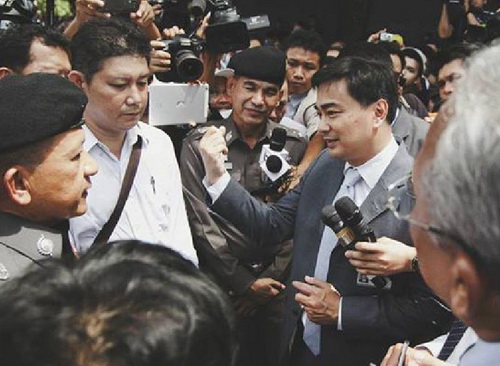Well-Mannered Thai Party Throws Down Its Gloves in Government Protests
By THOMAS FULLER
Published: August 25, 2013
Thousandsofdemonstrators cheered in a vacant lot here on Saturday as speakers threatened to “overthrow” the government. But unlike in previous years, this time the protesters were members of Thailand’s oldest political party, the Democrat Party, which has long had a reputation as the staid, well-mannered and intellectual voice of the Bangkok establishment and has been firmly dedicated to resolving differences inside Parliament, where the Democrats lead the opposition.
The threats by some of the Democrats’ leaders to lead large-scale street demonstrations in the style of the Arab Spring — stunning to many Thais because it seems so out of character for the party — underlines the persistence of divisions in Thailand and raises the prospect of a return to the political turmoil that left more than 90 people dead on the streets of Bangkok in 2010.
“We are gathering up the masses, people left behind by this government,” Sathit Wongnongtoey, a Democrat Party member of Parliament, told the crowd on Saturday in front of a backdrop with a huge clenched fist. “We will rise up and fight.”
The acrimony between the Democrats and the government of Prime Minister Yingluck Shinawatra centers on a number of legislative issues, chiefly an effort by the government to pass an amnesty law for those involved in the 2010 protests. The Democrats oppose the bill, saying it might also apply to those who insulted the monarchy or committed serious crimes.
But the broader conflict appears to stem from the Democrats’ feeling of powerlessness in the face of the resurgence of Thaksin Shinawatra, Ms. Yingluck’s older brother, who sets the broad policy lines for the government and the Pheu Thai Party despite living abroad since 2008 in self-imposed exile to escape corruption charges.
Abhisit Vejjajiva, a former prime minister who leads the Democrats, has been under relentless pressure since losing parliamentary elections two years ago. He was charged with murder in December in the deaths of protesters in 2010, when he was prime minister.
Mr. Abhisit, who was born in Britain and educated at Oxford, has been criticized for being unable to connect with rural voters. The formal language and academic bearing favored by the Democrats won over some Bangkok voters, but the party has been trounced in the rice-growing northeastern part of the country, where one-third of the electorate lives.
“The image of this party in the past has been that of a very good and elegant performer, like Maradona on the soccer field,” said Sombat Boonngamanong, a political activist, referring to the fleet-footed Argentine athlete. “Now they want to play street soccer.”
At Saturday’s rally, Mr. Abhisit’s speech was earthy and markedly more aggressive than his previous remarks. Other party leaders used coarse language to criticize the government, and the crowd repeatedly called for Ms. Yingluck’s ouster with a vulgar chant.
On Sunday, Ms. Yingluck held a meeting to call for national reconciliation, an effort the Democrats have refused to join.
Even inside Parliament, the Democrats have sought to portray themselves as street fighters, with one lawmaker shoving a security guard during a ruckus that a Thai newspaper described as a “disgrace.”
“We want to awaken the masses,” said Nipit Intarasombut, a lawmaker who leads the Democrats’ radical faction that advocates aggressive street demonstrations.
“It’s a new era for the party,” he said. “People today are fearful. But once we can mobilize hundreds of thousands of people on the streets, the fear will disappear.”
It is unclear whether the Democrats’ supporters, especially Bangkok’s affluent voters, will put up with the discomforts of prolonged demonstrations. Punishing heat and drenching rains have tested previous protesters.
At the rally on Saturday, one of a series held this month in Bangkok, the Democrats’ supporters said they were committed to opposing the government, but seemed sheepish when asked whether they were ready for sustained street protests.
“We would have to see if it’s convenient,” said Pongporn Chaicharus, a financial planner at a Bangkok hospital. His partner, Tiparpa Aimsaby, who sells computer software, also looked uncertain. “If it’s not convenient, we could watch it from home,” she said.
In a country with a history of military coups and other democratic disruptions, the Democrat Party for years lived by the mantra “I believe in the parliamentary system,” the words of Chuan Leekpai, a former prime minister who is now the party’s elder statesman.
Some in the party say it is a mistake to abandon that principle. Alongkorn Ponlaboot, a veteran lawmaker, calls the protest strategy “destructive democracy.”
“We will not win people over with mob democracy,” Mr. Alongkorn said. “It will cause indefinite divisions.”
What the party needs, Mr. Alongkorn said, is a wholesale restructuring, including a system of primaries to choose candidates. The party should focus on bread-and-butter issues at a time when the Thai economy and others in the region are faltering, he said.
Data released this month showed that Thailand had entered a mild recession.
Others have raised questions about how much support the Democrats can mobilize outside the party for their protests. Mr. Sombat, the activist who is a former protest leader for the “red shirts,” a movement that helped propel the Yingluck government to power, said the Democrats were misreading the national mood.
“The society is not ready to spill out into the streets,” he said.
In a sign that he might be right, the leadership of the “yellow shirts,” another once-prominent protest movement, resigned Friday.
“We have been through that and learned it’s tiring and expensive,” Mr. Sombat said of street protests. “No one wins. We can’t do this anymore. It’s not the way out of the problem.”
Poypiti Amatatham contributed reporting.
A version of this article appears in print on August 26, 2013, on page A8 of the New York edition with the headline: Well-Mannered Thai Party Throws Down Its Gloves in Government Protests.
 ภาพจาก ข่าวสด
ภาพจาก ข่าวสด


 กระทู้ร้อนแรงที่สุดของวันนี้
กระทู้ร้อนแรงที่สุดของวันนี้
























 กระทู้ล่าสุด
กระทู้ล่าสุด


 รูปเด่นน่าดูที่สุดของวันนี้
รูปเด่นน่าดูที่สุดของวันนี้
















































